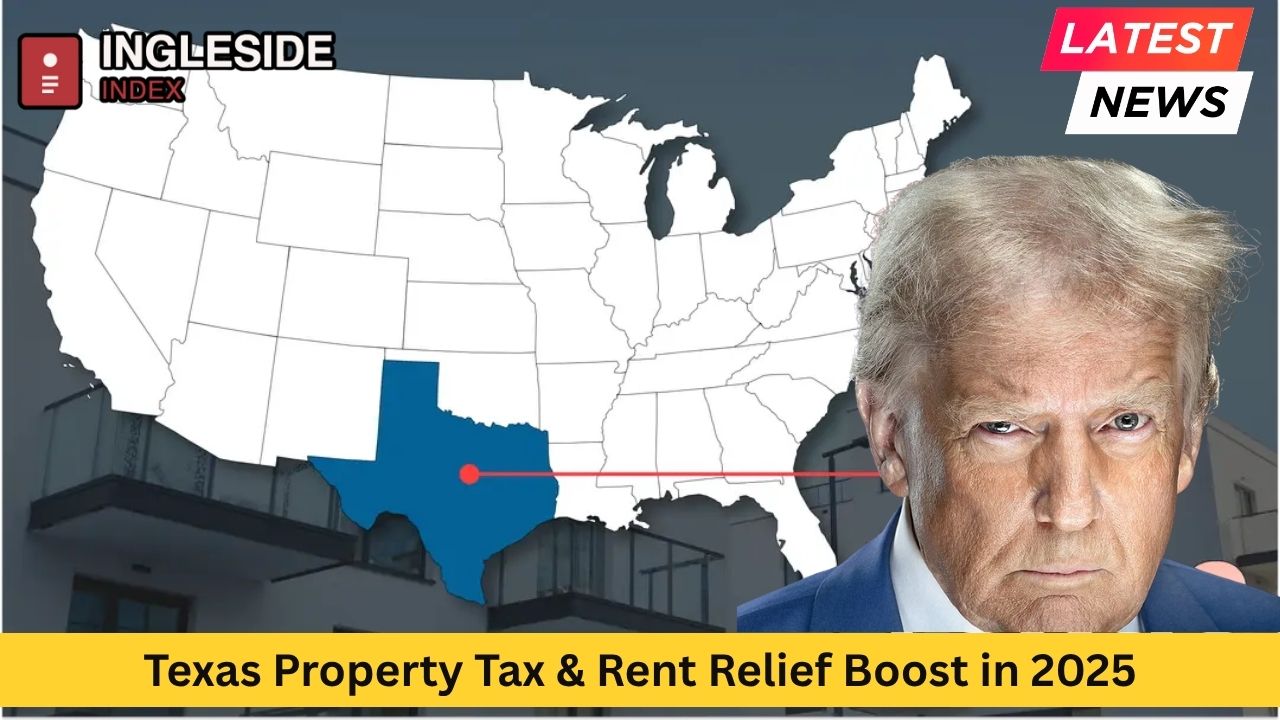Texas has long stood out for its robust economy, low taxes, and fast-growing metropolitan centers. However, behind the state’s remarkable economic expansion, millions of Texans—particularly seniors and low-income families—have struggled with escalating property taxes and rising rent costs in cities like Houston, Dallas, San Antonio, Austin, and El Paso. In 2025, Texas launched ambitious new legislation to provide historic property tax relief and rent rebates, aiming to make housing more affordable and secure for its most vulnerable residents.
This comprehensive guide dives into the details of the new property tax relief and rent rebate programs, explaining how they work, who qualifies, and what this means for communities across the Lone Star State.
The Texas Property Tax Burden: Why Relief Was Needed
While Texas boasts no state income tax, it is often ranked among the states with the highest property tax rates nationwide. Cities such as El Paso and McAllen have property tax rates around or above 2.3%, while fast-growing metro areas like Houston (Harris County), Dallas, Fort Worth (Tarrant County), and Austin (Travis County) also see substantial tax rates averaging between 2% and 2.5%. Much of this tax burden funds essential services like schools, police, and roads, but it leads to hefty annual bills for homeowners—especially for those living on fixed or modest incomes.
For seniors in Abilene, Killeen, Lubbock, and suburbs across Texas, rising tax bills have threatened to displace lifelong residents. Meanwhile, in urban hubs like San Antonio and Houston, renters have often been left out of the relief conversation, facing steep rent increases with little recourse or support. In 2025, lawmakers made the move for more inclusive, sweeping reforms.
Landmark Property Tax Relief: A Closer Look
Homestead Exemption Increases
The centerpiece of Texas’ new approach is the dramatic expansion of homestead exemptions—the portion of a home’s value shielded from taxation:
-
The general homestead exemption rose to $140,000 from $100,000, meaning a typical homeowner will pay property tax on $140,000 less of their home’s value.
-
For seniors (age 65+) and Texans with disabilities, a special exemption now guards $200,000 of a homestead’s value.
This move means that a homeowner in Dallas with a home worth $325,000, for instance, could see their taxable value cut by nearly half. In McAllen, where rates are high and property values have climbed, the savings are substantial enough to make a real difference in monthly budgets.
Total Savings for Seniors and Disabled Texans
For the approximately 2 million Texas households led by senior citizens or disabled residents, the expanded exemption doesn’t just lower property tax bills—it eliminates school property taxes entirely for the average homeowner over 65. This is crucial in cities like Plano, Galveston, and Amarillo, where seniors make up a major share of the homeowner base.
Combined with past reforms, average annual savings for seniors and disabled Texans now top $950 per year. Ten years ago, seniors in Texas received just $25,000 in homestead exemption—now, they benefit from $200,000 protected, allowing many to stay in their homes and communities as they age.
How Local Governments Are Impacted
While the state government does not directly levy property taxes (that’s left to local governments), the new laws require Texas to cover lost school funding from the increased exemptions, ensuring that cities and school districts—like those in Austin, Pearland, Beaumont, and San Antonio—do not face shortfalls in essential services even as residents see relief.
Spread Across the State
Here’s a summary of property tax rates for major Texas cities:
| City | Typical Property Tax Rate | Example Saving from Reforms |
|---|---|---|
| El Paso | 2.6% | Homeowners save hundreds yearly |
| McAllen | 2.3%+ | Significant school tax reductions |
| Pearland | 2.2% | Notable drop for seniors |
| Beaumont | 2.1% | More affordable for retirees |
| San Antonio | 2.0% | Widespread savings citywide |
| Dallas | 2.18% (County) | Mid to high-savings for families |
These cities represent both the challenge and opportunity that Texas lawmakers sought to address. In smaller cities—like Abilene, Laredo, and Tyler—homeowners also benefit, with the effect largest where local tax rates have risen fastest.
Rent Rebates for Low-Income Families: A New Support Structure
Texas’ relief package isn’t just for homeowners. Recognizing that renters compose roughly 35% of Texas households, including 3.8 million people from Houston to Amarillo, the state introduced rent rebate legislation for the first time.
How Rent Rebates Work
Under the new plan:
-
Eligible renters—primarily low-income families and seniors—can qualify for up to a 10% rebate based on the prior year’s rent paid.
-
Landlords submit documentation to verify tenants’ payments, and the state then issues rebates directly to qualifying renters.
-
This approach adds stability for residents in rapidly changing urban neighborhoods in Dallas, Fort Worth, Austin, and fast-growing suburbs like Frisco, Round Rock, and The Woodlands.
This program arrives at a critical time: In Texas, only 25 rental homes are affordable and available for every 100 very low-income households, and rent affordability has become acute in cities of all sizes.
Addressing the Housing Affordability Crisis
In 2025, the gap between incomes and rents in Texas reached new highs. In Houston, a family of four earning 80% or less of area median income (about $64,000/year) is considered eligible for rental assistance. The state has rolled out dedicated funds for tenant-based rental assistance (like Galveston’s TBRA program), and the new rebate system is designed to dovetail with these federal and local aid programs.
The impact: More Texas families can avoid eviction, homelessness, and the constant stress of rising costs, especially in high-demand cities like Austin, San Antonio, and Arlington.
Additional Support Measures for Seniors
Beyond property tax relief, seniors in Texas are now eligible for larger state tax deductions—the “Senior Bonus” deduction—of up to $6,000 for individuals and $12,000 for couples starting in 2025. These new deductions, combined with property tax freezes and expanded homestead exemptions, offer a powerful lifeline for retirees living on Social Security in places as diverse as Corpus Christi, Midland, and Denton.
Federal Partnerships Expanding the Impact
Texas is coordinating with federal initiatives, such as the Home Efficiency Rebate (HOMES) and Home Electrification Rebate (HEAR) programs, to further support low-income households. The state anticipates nearly $700 million in federal funds to help families reduce energy bills through home upgrades—benefitting both homeowners and renters in cities large and small.
How to Qualify and Apply for Tax and Rent Relief
For Homeowners
-
Ensure the homestead exemption is filed with your county’s tax office.
-
Seniors and disabled residents should apply for the enhanced exemption using documentation of age or disability.
-
If in doubt, check with the local appraisal district (every county from Harris to Travis to Williamson has an office) or start online with the Texas Comptroller’s resources.
For Renters
-
Keep accurate records of rent payments.
-
Ask your landlord or property manager if they are participating in the rent rebate program (the process requires their cooperation).
-
Low-income renters should also check eligibility for local programs, especially in cities like Galveston, Houston, and Dallas, where rental support is often managed through local housing authorities.
The Larger Economic and Social Impact
Retaining Residents and Communities
With relief targeted at those who need it most, thousands of seniors will avoid being forced out of their homes. Neighborhoods in San Antonio, Waco, Irving, and throughout rural Texas will remain more stable, supporting local economies and retaining the community roots that define Texas culture.
Boosting Housing Affordability
By reaching low-income renters, Texas’ rent rebates directly address eviction risk and homelessness. The Lone Star State still faces a shortage of over 650,000 affordable housing units, so these new supports are a necessary step forward—but ongoing investment and innovation will be required.
Maintaining Public Services
Crucially, by structuring relief so state funds make up for lost local revenue, Texas has affirmed its commitment to education, infrastructure, and emergency services in places like Bexar, Harris, Fort Bend, and Collin counties.
Looking Ahead: What Texans Can Expect
Texas’ 2025 property tax and rent rebate packages mark the largest investment in direct tax relief in the state’s history and position Texas as a leader among states seeking to protect residents from runaway housing costs. The reforms are not a silver bullet, but they represent a commitment to helping all Texans—whether lifetime homeowners in El Paso, young families renting in Austin, or retirees in Corpus Christi—secure a more affordable and stable future.
The path forward includes ongoing monitoring, community feedback, and fine-tuning of these programs, with lawmakers signaling that even more ambitious relief could be on the horizon, should revenue and voter support allow.
Conclusion
The historic expansion of property tax exemptions and rent rebates is reshaping what it means to afford a home in Texas. By focusing on seniors and low-income families—groups most at risk of being left behind in the state’s rapid growth—lawmakers have provided both immediate relief and a foundation for future prosperity.
From the skyscrapers of Dallas to the quiet streets of Lubbock, from the booming suburbs of Houston to the border city of El Paso, the effects of this legislation will ripple outward, making the Texas dream of secure and affordable housing more achievable for millions.











Leave a Comment